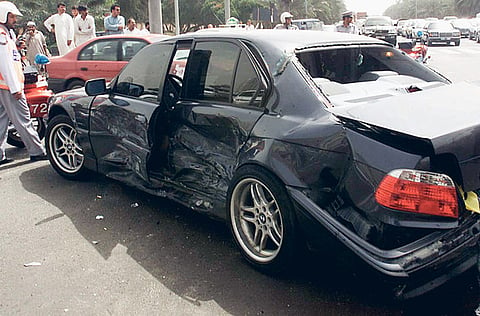Accidents could increase by 20-50% during Eid
Commuters urged to take precautionary steps and follow traffic regulations in order to avoid complications

Abu Dhabi: The number of traffic accidents during Eid is expected to increase by 20 to 50 per cent, according to statistics compiled by the three major public hospitals, who also have provided commuters with advice about what to do if they come across an accident.
Emergency Room (ER) consultants are urging commuters who wish to help others during a car accident, to take precautionary measures and follow the correct traffic regulations, in order to avoid further complications.
"Commuters who want to help are advised to look out for their own safety, as well as the safety of bystanders and accident victims. They should call the Police Ambulance Service and only provide first aid services if they're trained and certified to do so. The number of vehicle accidents in hospitals usually increases by 50 per cent during Ramadan and Eid," Head of the Emergency Department at Al Rahba Hospital told Gulf News.
The number of trauma visits to hospitals during 2009 was 540, traffic accidents were 10 per cent and in 2010, the number of trauma cases reached 610 patients, with traffic accidents representing 10 per cent of those. There was also a clear increase in the number of car accidents from patients visiting the ER.
Dr Jihad Awad, the ER Consultant at Al Mafraq Hospital, saw a 20 per cent increase in the number of patients treated due to traffic accidents during Eid, out of which five per cent of those were critical, these he says were mostly young males.
"We hardly see families and females; it's mostly young male teenagers who are in a rush to commute. A lot of the time, road accidents happen because the driver witnesses a problem on the road and gets out of his or her car to help. He or she means well, but they end up parking on the wrong side of the road.
Common medical conditions among patients admitted to hospital ER's due to road accidents included multiple cuts and wounds, bruises, bone fractures and concussion.
Dr Murray Van Dyke, Chairman of the Emergency Department at the Shaikh Khalifa Medical City (SKMC) asks commuters who witness a car accident to speak to contact the Police Ambulance Service, who are trained to offer immediate services for accident victims on the road.
"I would not recommend that members of the public engage in treating or extricating people at accident scenes. The scene is unsecured, therefore unsafe; people who try to help could be injured themselves. Beyond that, the accident victims could be injured if not removed by trained personnel. Further more, the injured could be caused unnecessary pain if removed by untrained people," advised Dr Van Dyke.
Tips
When you witness accident scenes on highways or roads:
- Park your car in a safe area without breaking all of a sudden
- Call the police on 999 immediately
- Provide first aid only if trained and certified
For those who are certified to provide first aid during an accident make sure you follow these steps:
- Maintain the individuals head/neck in a normal position and not sideways
- Keep the patient on a flat surface, either on the floor, or on a wooden surface, to avoid movements of body parts
- Packing all bleeding sites using a clean cloth
- Stabilise and immobilise deformed or painful extremities (body parts)
- Keep the individual's airway open through mouth to mouth resusciation
Source: Dr Jihad Awad, ER Consultant at Al Mafraq Hospital


